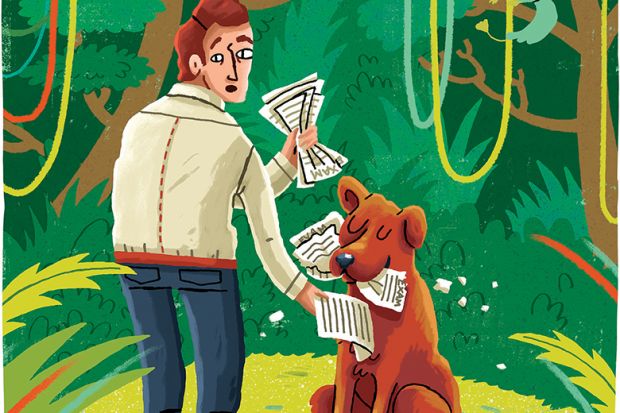Life in a southern hemisphere university is often back to front. Our academic year ends in October, with November being full of exam-board meetings and graduation ceremonies. Nonetheless, as a British vice-chancellor of a university in Papua New Guinea, I find academic life here remarkably familiar, albeit more extreme. As a result, I frequently find myself questioning the fundamentals of university practice.
In the UK, it is not unknown for class sets of marks to require moderation and adjustment. Nor is it impossible for an entire year’s batch of exam papers to be left on a train or otherwise misplaced. So when a set of our exam papers was reported stolen last November, I was not in completely foreign territory.
I was, however, shocked to discover that the stolen bag had also contained the class coursework marks and the only electronic back-up copy of them. Its carrier’s explanation of how the bag came to be stolen was long, involved and rather suspicious. However, in Papua New Guinea, just because something sounds unbelievable does not mean that it’s not true. It was entirely possible that the computer containing the marks, the back-up hard drive and the exam scripts really had all simply been pinched.
That said, alternative explanations did seem equally plausible. Fortunately, before the exam board was obliged to decide how to allocate missing marks, the hot computer – but not the exam scripts – was handed to university security. The story of its disappearance and return still made very little sense, but at least now we had the coursework marks, which could be used for the whole module.
Being a small community, the students involved quickly discovered what had occurred. As you can imagine, they were not pleased. The class representative demanded that we give everyone a B grade, or a mark of 60 per cent, or something else so long as we told them what it was. We plumped for the latter option and reweighted the coursework marks.
Meanwhile, the member of staff concerned had obviously escaped without having to do any exam marking, while I was left wondering whether that was sufficient motivation to have fabricated the entire episode.
In all my many years of exam meetings in the UK, I don’t ever remember suspecting that a member of staff had deliberately lost exam scripts or arranged to have them stolen just to avoid marking them. This may be as ludicrous a possibility here as it is in the UK, but in this South Pacific nation – in which even the experienced British explorer Benedict Allen famously managed to get lost last year – you are never quite sure. I often mentally flagellate myself for becoming cynical enough to even suspect such things in the first place. But even as I am doing so, my worst suspicions are frequently confirmed.
None of this is meant to imply, however, that UK practice around exam results is whiter than white. Without wanting to name and shame individuals, during my career in the UK, I became aware of a few cases in which academics lost individual exam papers and, rather than admit to the error, submitted fabricated marks. As with crime statistics, it is impossible to provide definitive data on the frequency of such occurrences. Still, experience would suggest that they are extremely rare.
In UK universities, exam papers are routinely checked at the start of the marking process to document exactly who did and did not sit the paper. In my experience, it is much less common to check the scripts at the end of the process to ensure that they are all still present and correct. Generally, we rely on the professionalism of academics and expect them to own up to losing any manuscripts. Institutions then deal with missing marks on a case-by-case basis. I have no issues with this.
However, while working in the UK system, the erosion of trust in the professionalism of academic staff did give me some concerns. At the same time, I remained baffled as to why the integrity of support staff was never questioned. Have you ever come across a university that checks to see if the people entering the marks into student records are modifying those of friends or family members?
If I have learned anything from this episode, it has been the value of engaging in dialogue with students. In this culture in particular, it is important to demonstrate that any one of us can make mistakes, and that what matters most is owning up to the mistake and dealing with the consequences in a transparent and fair way.
In the UK, I don’t remember any institution ever reporting to students how often exam papers are lost, or how missing marks are accounted for. This seems very remiss. After all, it is not just individuals who learn from their mistakes: they can also be very instructive for others. And all students are familiar with that anti-intellectual dog and its insatiable appetite for gobbling up homework.
John Warren is vice-chancellor of the Papua New Guinea University of Natural Resources and Environment.
POSTSCRIPT:
Print headline: Anything to declare?
Register to continue
Why register?
- Registration is free and only takes a moment
- Once registered, you can read 3 articles a month
- Sign up for our newsletter
Subscribe
Or subscribe for unlimited access to:
- Unlimited access to news, views, insights & reviews
- Digital editions
- Digital access to THE’s university and college rankings analysis
Already registered or a current subscriber? Login







